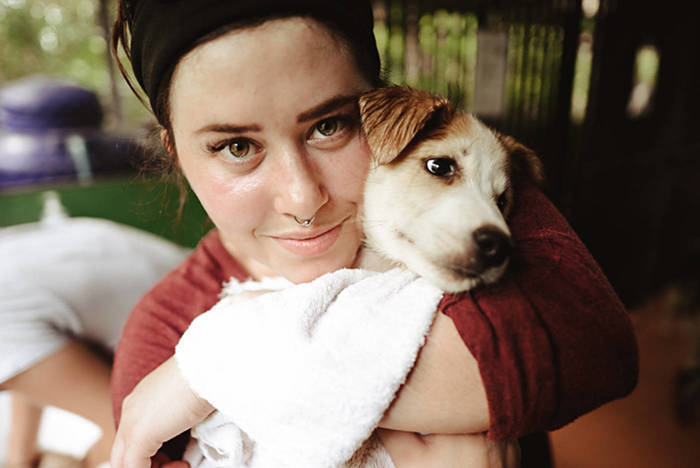09.08.2023/XNUMX/XNUMX / Tips & things worth knowing
Veterinary medicine abroad – what options are there?
Medicine – the dream study of many, but for many in Germany it remains just a dream. No matter whether veterinary medicine, human medicine, dentistry or other disciplines – top grades are expected for every course of study in order to get a place. Even then, it will be difficult to get a place at a renowned university or your dream university. An alternative in which you don't waste a lot of time waiting for semesters is to study abroad.
Here we will introduce you to a few options where you can study veterinary medicine abroad and what other options there are for gaining experience in this area.

What are the advantages of studying veterinary medicine abroad?
You can study veterinary medicine at many locations in Europe. It all depends on your budget. In many Eastern European countries such as Romania, Lithuania, Latvia and Hungary you can study veterinary medicine quite cheaply and sometimes in German. But there is also a veterinary medicine course in Switzerland and Austria.
But studying abroad looks a little different than in Germany. For one thing, it is usually much shorter. Instead of eleven semesters, there are often only six. Furthermore, you don't do any (pre-)physics abroad and the course is more practice-oriented. On the other hand, study programs abroad do not have an NC like we know from Germany. Often only certain grades are important; there are also job interviews and aptitude tests to determine whether you are suitable for the course of study.
After your studies, you are not limited to the country in which you studied. Various laws allow you to either move to Germany during your studies if there are free places, or to work in different European countries after successfully completing your studies.
Where can I study veterinary medicine abroad?
Here we introduce you to some locations for studying veterinary medicine abroad.
Switzerland
In Switzerland it is possible to study veterinary medicine at both bachelor's and master's levels. The bachelor's degree program usually lasts three years and imparts basic knowledge and interdisciplinary content. In the master's program you have the opportunity to set priorities. Courses on digitalization and communication as well as workshops on learning strategies and communication are particularly interesting. There are also special blocks where you deal with wild and laboratory animals.
In order to be admitted, you must either take an aptitude test or have a university entrance qualification (HZB). The on-site lessons are usually held in German, but sometimes also in French.
Switzerland is one of the more expensive options to study veterinary medicine. The cost of studying usually amounts to 1.000 to 1.300 CHF per year.
Austria
In Austria there is the option to study veterinary medicine, which is most similar to the German system. The course lasts twelve semesters and is very cost-effective at just €16,50 per semester. There you have the opportunity to study veterinary medicine with practical training. During your studies you can choose between a clinical and a non-clinical focus.
Lectures on learning and work strategies as well as the opportunity to take elective courses in the areas of economics, communication, reflection and personal and scientific training are particularly interesting. There is also an emergency block and a clinical outpatient clinic where you can gain practical experience. There are also lectures on pet behavior, the science of veterinary medicine, and even a Clever Dog Lab. To be admitted, you need a general university entrance qualification and the lessons are held in German.
Hungary
Another example of studying veterinary medicine abroad is Hungary, which is very popular with German prospective students. At the University of Budapest, professional experience is given greater weight than the Abitur grade when selecting students. The first semester can be completed in German, which makes it easier to get started. The practical year only takes place after all examinations have been completed.
Lectures on computer science and biomathematics are particularly interesting and enrich the course. Another advantage is that you can take an exam more than three times, which takes some of the pressure off. There is also the option of inactive registration if you want to take a break from your studies. Please note, however, that the semester holidays only take place in summer. To be admitted, you need a university entrance qualification (HZB), but there is no entrance test. Individual school subjects and a high level of motivation are more important than the Abitur average. Lessons are offered in German, English and Hungarian.
The cost of studying is €12.480 per year, making this alternative one of the more expensive.
Netherlands
The Netherlands is always a popular destination for German students, as the veterinary medicine course is completed in six semesters with a bachelor's degree. Dutch universities have an excellent reputation in animal and agricultural sciences. They are also very well equipped and offer a pleasant learning atmosphere. Studying in the Netherlands is very practice-oriented.
In comparison to other courses of study, there are no admission restrictions in the form of a numerus clausus for veterinary medicine. However, the veterinary medicine course has a numerus fixus, which means that there is a fixed number of study places that are allocated per university and course of study. If there are more applicants than study places, either a lottery or an individual application process takes place.
Although there is no NC like in Germany, there are certain school requirements such as a general university entrance qualification and you must have taken certain subjects at school, such as mathematics in the basic course and chemistry in the Abitur. There are also language requirements such as an NT2 level in Dutch, as some subjects are only offered in Dutch. You also need either an IELTS test, TOEFL test or a Cambridge certificate for your English level so that you can deal with the specialist literature.
If you want to work as a veterinarian in Germany after studying veterinary medicine in the Netherlands, you must provide proof of approval, i.e. state approval, as a veterinarian from the Netherlands. However, there are different regulations for licensing for each federal state. It is therefore best to find out more about your state.
In addition to living costs such as rent and food, there are also tuition fees in the Netherlands, which are set each year by the Dutch state. Compared to Germany, studying in the Netherlands is a little more expensive, but there are many good financing options from both the German and Dutch sides.
Volunteer work and internship abroad in veterinary medicine
If you are still unsure whether veterinary medicine is your calling, an internship or volunteer work abroad would be a good chance to get to know different areas and explore the different aspects of a profession. Through such experiences you can find out whether working with animals suits you and whether you want to commit to this area in the long term.
There are many veterinary projects abroad where you can help injured or abandoned animals. You can not only look after dogs and cats, but also work with predators, monkeys or other large animals, because they Volunteer work in animal welfare is very diverse! For example, support one Veterinary clinic in Crete or help the team in reception centers with medical care, for example in Thailand or Vietnam . There is also the possibility of caring for sea creatures, such as: turtles freeing from fishing lines or treating injured fish. Finally, there are many options for animal rescue abroad.
The Volunteering abroad It also allows you to develop personally, get to know new cultures and do something good at the same time. You can expand your skills and knowledge, make new friends and gain valuable experience that can help you decide on your future career.
Conclusion: Veterinary medicine abroad – a sensible option?
There are numerous ways to make your dream of becoming a veterinary doctor come true. However, if you are unsure, it might make sense to first get a taste of the job through volunteer work or an internship abroad. If you choose volunteer work or an internship abroad, you can gain valuable insight and find out whether veterinary medicine is really right for you. You have the opportunity to get to know different areas of the job and decide whether you like them.
If you're already sure but your grades don't quite match your dream, studying abroad can be a good alternative. Not only do you save yourself waiting semesters, but you can also learn things that are not even offered in Germany. No matter what your budget is, you're sure to find a good alternative to studying veterinary medicine abroad.
More projects that interest you could
Have you not yet discovered a suitable program for your time abroad? No problem, we will present you more Volunteer projects abroadthat might pique your interest.
Are you perhaps still at the beginning of thinking about your trip and have no idea what might be right for you? Whether you want to go abroad as a volunteer for a short time, or if you prefer FSJ up to 12 months abroad afford? Maybe there is one Internship abroad in a specific subject area the best way for you to gain experience abroad?


Thailand | dogs & cats


Viet Nam | dogs & cats


Greece | dogs & cats
